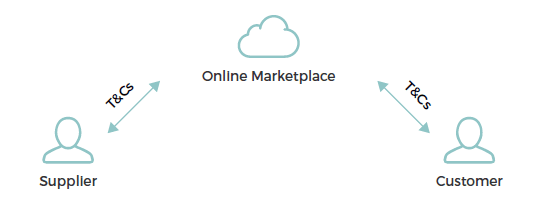
If your business operates online, you should have terms and conditions outlining the relationship between your customers and your business. If you collect personal information about your customers, online or otherwise, you also need to be aware of privacy laws that could apply to your business.
In this chapter, we’ll explore privacy protections and legal issues for businesses operating online.
Online business
If your business operates online, it’s important to ensure you have terms and conditions in place to govern the relationship between your business and your customers.
These will be much the same as terms and conditions for any business, but there are some specific technology-related terms that may need to be included in your agreement. The sorts of terms and conditions you need depends on your business model and the extent to which you operate online. We’ve set out the most common types of T&Cs below.
Website T&Cs
Whether you’re a business that runs mostly offline and just has a simple website or you’re a business that operates completely online, it’s a good idea to have basic Website Terms & Conditions. This will include terms to limit your liability for anything that comes from a link on the website or if anyone relies on information from the website to their detriment.
App, SaaS and eCommerce T&Cs
If you run an App, SaaS or eCommerce business you’ll need some additional terms and conditions for use with your customers. Some of the key terms you’ll need are below:
App Terms & Conditions
- You may need to include a software licence so that users of the app can’t take your software for another purpose.
SaaS Terms & Conditions
- You will also likely need a software licence in your terms and conditions.
- You may need terms and conditions specific to the subscription service e.g. what happens if someone wants to cancel their subscription?
eCommerce Terms & Conditions
- You will need terms and conditions related to delivery, returns and refunds.
Online marketplaces
Online marketplaces are becoming an increasingly common business model. This is a business that connects suppliers and customers through an online platform – think of Uber, Airtasker, Gumtree or AirBnB.
If you run an online marketplace, it’s essential to have good Marketplace Terms & Conditions that are tailored to your business model. You can either have your supplier and customer T&Cs rolled into one document, or keep them separate. Either way, as a platform intermediary, you want to make sure that you limit your liability for the actions of the suppliers and customers using your marketplace, because you will often not have the capacity to supervise each of their dealings.
Here’s how T&Cs work for an online marketplace model:

Finding a lawyer with experience in drafting Marketplace Terms & Conditions can be difficult because it’s a relatively new area. Luckily, Sprintlaw specialises in online business, including online marketplaces, so we’d be happy to help you out.
Privacy
I am text block. Click edit button to change this text. Lorem ipsum dolor sit amet, consectetur adipiscing elit. Ut elit tellus, luctus nec ullamcorper mattis, pulvinar dapibus leo.
In conclusion…
In this final chapter we’ve learned about some of the extra legal considerations for online businesses in New Zealand. In particular, there are some things to be aware of in your dealings with customers and suppliers through your online platform – such as privacy, online payment, and technology-specific terms. Sprintlaw specialises in legals for online business, so if you want help getting your legals sorted – or even just a quick chat about what you need – feel free to get in touch!
Interested in working with us?
Tell us about your legal issue and we’ll put together a fixed fee quote for you.

 Previous
Previous